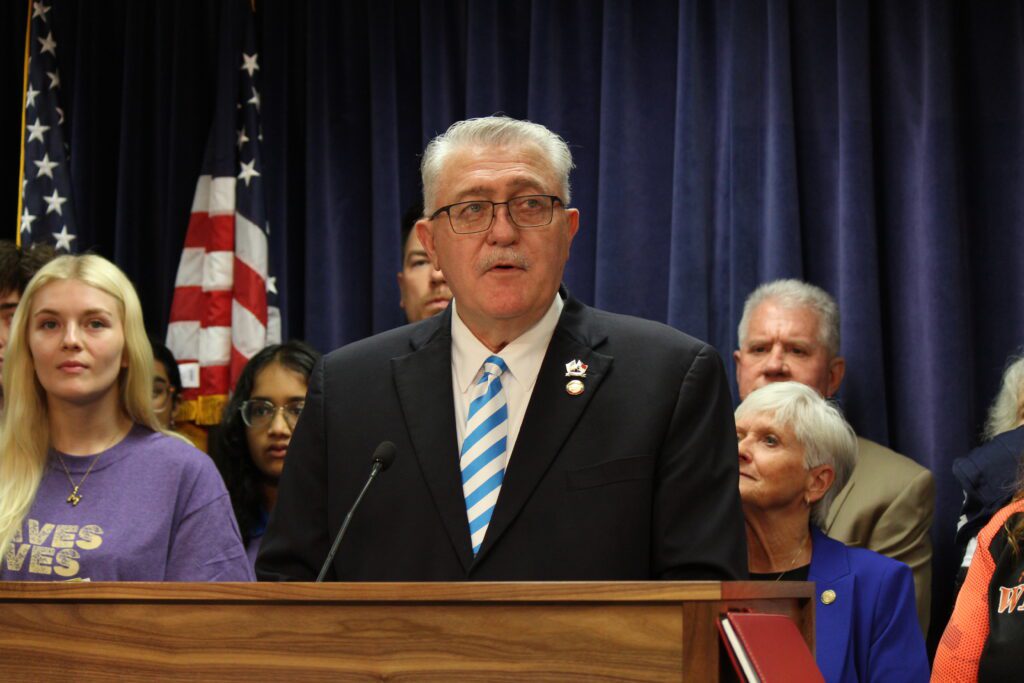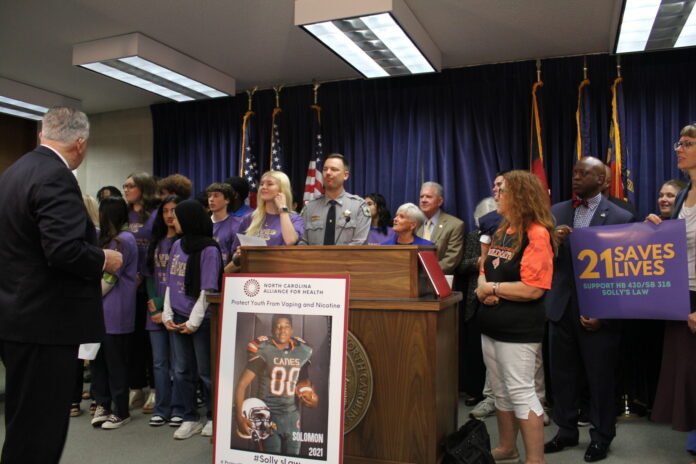Lawmakers and advocates once again convened at the Legislative Building in Raleigh on Tuesday to call for House Bill 430 — titled “Solly’s Law,” which would restrict youth vaping — to be taken up by the General Assembly.
Both the House and Senate versions of the bill have been in the rules committees since March, when the bill was first introduced.
“We have waited patiently for these bills to be assigned to the appropriate committee,” said Rep. Donnie Loftis, R-Gaston, at a press conference. Since neither version of the bill has progressed past the rules committee, neither has had a chance to be publicly discussed.
Sign up for the EdWeekly, a Friday roundup of the most important education news of the week.
Loftis noted that the crossover deadline has passed, which means most bills that haven’t passed at least one chamber are ineligible to become law this session. However, because there’s funding attached to HB 430, it is not subject to the deadline, he said.
Sen. Gale Adcock, D-Wake, the sponsor of the Senate version of the bill, also spoke at the press conference. Other lawmakers in attendance included Rep. Stephen Ross, R-Alamance; Rep. Bill Ward, R-Pasquotank; Rep. Donna White, R-Johnston; and Rep. Dennis Riddell, R-Alamance.

What would ‘Solly’s Law’ do?
E-cigarettes, also called vapes, are classified as tobacco products in North Carolina. They are the primary target of the bill, according to its advocates.
HB 430 would raise the minimum age to buy tobacco in North Carolina from 18 to 21 and establish a permitting system for tobacco retailers. (Federally, the required age for purchasing tobacco is 21.) The application fee for retailer permits would be $400.
Loftis said approximately 75% of the estimated 15,000 vape retailers in North Carolina are already being regulated by Alcohol Law Enforcement (ALE), and that no additional fee would be required for those businesses.
The $400 fee would provide for the additional ALE staffing required for inspections and audits of retailers for compliance, Loftis said.
The bill would also require retailers to post signage, make selling or assisting in selling tobacco to anyone under 21 a Class 2 misdemeanor, and allow ALE agents to investigate and inspect retail locations for compliance.
North Carolina, a state with historical ties to tobacco, ranks sixth in the nation for youth vaping, according to the North Carolina Alliance for Health.
“Solly’s Law” is named for Solomon Wynn, a high school student and football player who died of illnesses related to vaping.
What did advocates say?
“When we lost Solomon, I vowed to make a difference in the lives of teenagers so no family would have to go through what my family has experienced,” said Charlene Zorn, Solomon’s stepmother.
Zorn said she sent a letter to House Speaker Destin Hall, R-Caldwell; Senate President Pro Tempore Phil Berger, R-Rockingham; and the chairs of the rules committees asking for their help “to get this bill out of what felt like a corner it was stuck in forever.”
She said Thursday would have been Solomon’s 17th birthday. “What better a way to honor his memory than to get a hearing scheduled for Solly’s Law?”
So far, Zorn said she hasn’t received a reply to her letter.
Students wearing T-shirts that said “21 Saves Lives” spoke of their experiences witnessing vaping in their schools.
“We see it in the bathrooms, we see it in the hallways, we even see it in the classrooms. It’s everywhere, and it’s affecting our students more than adults,” said Madison Kornegay, a rising junior at East Duplin High School.
Kornegay and Harley Lanier, another East Duplin High student, worked this year to inform their peers about the risks of vaping as part of an honors chemistry class project. Now, they’re taking their advocacy beyond just their own school.
“This isn’t just a school problem anymore. It’s a public health crisis that’s hurting kids in every corner of our county and across the state,” Lanier said. “That’s why we’re not just speaking as students today. We’re speaking as advocates because we know education alone isn’t enough.”
Josh Dobson, president of the North Carolina Healthcare Association, said HB 430 would reduce health care costs by keeping kids safe in the short term and keeping North Carolinians out of the hospital in their later years.
“Tobacco, be it from smoking, or now vaping, is still the number one preventable cause of early illness, chronic disease, disability, and death in North Carolina and our country,” Dobson said. “It is time to do something about it, and this bill is a good place to start.”
Other organizations represented at the press conference included the North Carolina Association of Local Health Directors, Duke Health, the North Carolina Public Health Association, the American Heart Association, and the Justus-Warren Heart Disease and Stroke Prevention Task Force.
What’s next?
Loftis said he is aware of support for raising the required age to purchase tobacco from 18 to 21. But enforcing the other half of the bill — the licensing of retailers — “is just as critically important in preventing more teens from getting addicted, or far worse, dying from vaping,” Loftis said.
He said there was concern about the application fee for retailers from the National Federation of Independent Business.
“There was some concern that $400 may be so detrimental to a business, $400 may put them out of business,” Loftis said. “And I’m thinking, if $400 is the difference between you staying open and closed, a child’s life is well worth more than $400 for your business.”
Adcock said she spoke to Senate leadership and was met with concerns about what the tobacco industry might think.
“That’s why this bill needs a hearing,” Adcock said. “We all know that every bill that’s filed is not perfect, as much as we try to make it that way. It’s the opportunity to perfect it, and that’s what we’re asking for, is that forum.”
